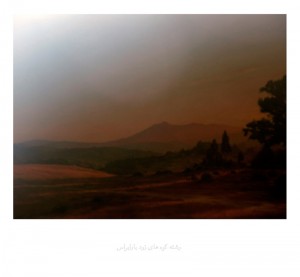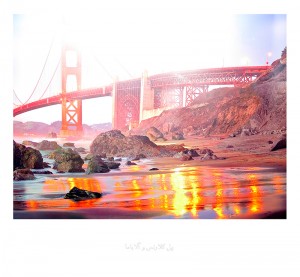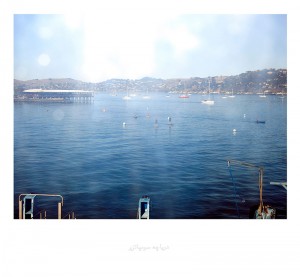(© Images courtesy of Mohammadreza Mirzaei, from the series ‘Fictitious Entries’, 2013-14 )
Una Lettera a Guido Guidi
Mohammadreza Mirzaei
Caro Guido,
Spero che tu stia bene.
È passato più di un anno dall’ultima volta che ci siamo incontrati. Mi ricordo bene, fu il giorno dopo la nostra conversazione all’Accademia di belle arti di Ravenna, quando Luca Nostri ed io siamo venuti a casa tua, quella bella casa in mezzo al nulla che si chiama Ronta. Abbiamo discusso, abbiamo parlato di nuovo di Luigi, e poi siamo tornati alla nostra precedente conversazione sul paesaggio. Ho parlato del cinema neorealista e di come, a volte, i paesaggi siano diventati il primo piano anziché lo sfondo in questi film. Ho parlato di Ossessione di Visconti, Il grido e Il Deserto Rosso di Antonioni, Un Paese di Strand e Zavattini e del paesaggio in questi film, di un’Italia molto diversa da quella dei cliché (le Alpi, Firenze, Siena, Roma, l’Umbria, il Sud, Capri, le isole, il mare…). Del suo clima afoso e della sua luce, bianca e lattiginosa, dell’inverno grigio e nebbioso. Ti ho domandato se tu e Luigi aveste sperimentato l’immagine della vostra terra prima del cinema. Sapevo che quel paesaggio era il vostro e che nessun fotografo aveva lavorato lì. Siete nati e cresciuti lì. Quel paesaggio vi apparteneva, ma a volte penso che bisogni cambiarlo con qualcos’altro. Con una metafora, qualcosa di simile ma più grande dell’Emilia Romagna o di Modena.
Quando parlavo di sperimentare il paesaggio non nella natura – o forse dove finisce la natura – ma in un’immagine, onestamente stavo pensando a me stesso. Il tempo trascorso in Emilia Romagna, il tempo passato a parlare della fotografia italiana e di concetti come posizione, città, periferie, e infine paesaggio, tutto questo non faceva parte del mio mondo, il mondo di un bambino a Tehran. Là avevo visto solo smog, traffico, folla di persone in autobus o in metropolitana. Quando avevo dieci anni, dal balcone del nostro appartamento vedevo le montagne dell’Alborz e la neve sulle loro cime. Sono bastati pochi anni perché i nuovi grattacieli e complessi residenziali ostruissero la mia visuale. Anni dopo mi sono piaciute molto le foto dei paesaggi. Erano come una fantasia, quello che non avevo potuto vedere nella vita reale. E poi amavo la fotografia, e i paesaggi erano parte della sua storia. Anche se irraggiungibile, artificiale o astratta, come le esperienze che ho avuto di fronte alla natura, come due mesi fa sulla costa occidentale degli Stati Uniti.
Robert Adams in La bellezza in fotografia parla della qualità autobiografica delle opere dei fotografi che hanno lavorato con il paesaggio. Sono cresciuto tra le foto, e ho avuto un rapporto strano, ma ancora solido e costante con la terra. Essere negli Stati Uniti occidentali mi ha fatto tornare a quella sfida, incontrare la natura da vicino. Pensavo al concetto della fantasia, del momento dell’apparizione di quello che non può apparire. Come le foto tue e di Luigi. Come nelle storie di Dino Buzzati o Italo Calvino. Ero alla ricerca di quel momento. L’impossibile che la mia macchina fotografica poteva rendere possibile, quel secondo in cui la luce è più chiara o più scura, il momento in cui ho trovato il paesaggio come cartolina o layout dietro la finestra di un negozio, mentre ero alla ricerca di un alimentari. In quei momenti era come se avessi trovato una parte di me, un frammento della mia vita nella foto, e fiduciosamente pensavo al paesaggio non come quello caratterizzato da Adams, con un significato geografico, ma come qualcosa in grado di creare una nuova geografia, da un nuovo inizio. Può essere come il primo e l’ultimo sguardo.
Così, non sono sicuro che le mie foto siano tutte legate alla West Coast. In questi anni, aggirandomi per le strade di diversi Paesi nel mondo, ho capito che non è facile per me stabilire un rapporto personale con nessuna città. Sembra che le foto abbiano qualcosa del luogo in cui mi trovo, e qualcosa di quella città che non posso mentalmente lasciare. Come se tutte le mie foto fossero ancora state scattate a Tehran. Mi piacerebbe condividere con voi alcune di quelle foto e collegarle alle nostre conversazioni, con un anno e qualche mese di ritardo. Sto ancora pensando a tutti i discorsi che abbiamo condiviso.
Grazie di tutto,
Mohammadreza
A Letter to Guido Guidi
Mohammadreza Mirzaei
Dear Guido,
I hope you are well.
It is more than a year since we last met. I remember it well; it was the day after our conversation at the Academy of Fine Arts in Ravenna when Luca Nostri and I came to your house, that beautiful place in the middle of nowhere called Ronta. We had a discussion and spoke again about Luigi before returning to our previous conversation about landscape. I spoke about Neorealist Cinema and how, at times, landscapes have been foregrounded instead of remaining in the background. I spoke about Visconti’s Ossessione, Antonioni’s Il Grido and Il Deserto Rosso, Zavattini’s and Strand’s Un Paese (and the issue of landscape in these films) and about an Italy without clichés (i.e. the Alps, Florence, Siena, Rome, Umbria, the South, Capri, the islands, the sea…). I also spoke about its humid climate, its white and milky light, and its grey and foggy winters. I asked you if you and Luigi had experienced an image of your land before cinema. I knew that that landscape was yours and that no other photographer had worked there. You were both born and raised there. That landscape was yours, but sometimes I think it is necessary to change it with something else, a metaphor or something similar but greater than Emilia-Romagna or Modena.
When I spoke of experiencing landscape through an image and not nature (or perhaps where nature finishes), I was honestly thinking about myself. The time spent in Emilia Romagna, discussing Italian photography and ideas such as location, the city, the margins, and, finally, landscape, was so different from my childhood in Tehran. There, I used to see only smog, traffic, crowds of people on the bus or the underground. When I was ten years old I could see the snow-capped Alborz mountains from the balcony of our apartment. It did not take long before the sky scrapers and residential complexes blocked my view. Years later, it was photographs of landscapes that pleased me. They were like a fantasy, something which I could not see in real life. And besides I loved photography, and landscapes were part of its history; even if the fantasy is unreachable, artificial and abstract, like the experiences I had with nature two months ago on the West Coast of the United States.
Robert Adams, in Beauty in Photography, speaks of the autobiographical quality of photographers’ works dealing with landscape. I grew up with photographs, and I have had a strange but also solid and continuous relationship with the land. Being on the West Coast of the United States made me face the challenge of getting close to nature. I was thinking about the concept of the imaginary, of the moment when an apparition occurs out of something which cannot possibly appear. As in yours and Luigi’s photographs and the stories of Dino Buzzati or Italo Calvino, I was looking for that moment. The impossible made possible through my photographic machine, that moment when the light is more bright or dark, that moment when I have discovered the landscape as seen on a postcard or in a shop window display while food shopping. In those moments it was as if I had found a part of me, a fragment of my life in the photograph. Hopefully, I was thinking of the landscape not like that characterized by Adams, with a geographic significance, but as something capable of creating a new geography from a new beginning. It can be like the first and last look.
As a result I am not sure that my photographs are all linked to the West Coast. In those years, while wandering the streets of different countries of the world, I knew that it was not easy for me to establish a personal relationship with any city. It seems that the photographs have something of the place in which I find myself and also something of that city that I cannot mentally leave. It is as if all the photographs had still been taken in Tehran. I would like to share with you some of those photographs and link them into our discussion, even if a year and a few months late. I am still thinking of all the discussions we have shared.
Thank you for everything,
Mohammadreza
(Translated into the English by Oliver Brett)
Biography
Mohammadreza Mirzaei is an Iranian photographer, writer and translator. His recent book What I Don’t Have is published in Italy by Edizioni del Bradipo. He is also the translator of La Grammatica di Dio; short stories by Stefano Benni, from the Italian to the Persian.
Mohammadreza Mirzaei è un fotografo, scrittore e traduttore Iraniano. Ha pubblicato What I Don’t Have in Italia con Edizioni del Bradipo, ed ha tradotto in persiano il libro di racconti di Stefano Benni La Grammatica di Dio.





 Subscribe to Oliver Brett's posts
Subscribe to Oliver Brett's posts
Recent Comments